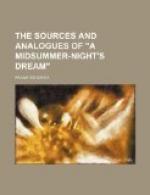Trains forth midwives in their slumber,
With a sieve the holes to number,
And then leads them from her boroughs
Home through ponds and water-furrows.
. . . . . .
She can start our franklins’ daughters,
In her sleep, with shrieks and laughters,
And on sweet St. Anna’s night
Feed them with a promised sight—
Some of husbands, some of lovers,
Which an empty dream discovers.
BEN JONSON, masque of A Satyr (1603).
* * * * *
A Proper New Ballad, intituled
THE FAIRIES’ FAREWELL: OR GOD-A-MERCY WILL
(To be sung or whistled to the Tune of the Meadow Brow by the learned; by the unlearned, to the Tune of Fortune.)
Farewell rewards and Fairies!
Good housewives, now you may
say;
For now foul sluts in dairies
Do fare as well as they;
And though they sweep their hearths no
less
Than maids were wont to do,
Yet who of late for cleanliness
Finds sixpence in her shoe?
Lament, lament old abbeys,
The fairies’ lost command;
They did but change priests’ babies;
But some have changed your
land;
And all your children sprung from thence
Are now grown Puritans,
Who live as changelings ever since
For love of your demesnes.
At morning and at evening both
You merry were and glad,
So little care of sleep or sloth
These pretty ladies had.
When Tom came home from labour,
Or Ciss to milking rose,
Then merrily, merrily went their tabour,
And nimbly went their toes.
Witness those rings and roundelays
Of theirs, which yet remain,
Were footed in Queen Mary’s days
On many a grassy plain.
But since of late Elizabeth
And later James came in,
They never danced on any heath,
As when the time hath bin.
By which we note the fairies
Were of the old profession;
Their songs were Ave Maries,
Their dances were procession.
But now, alas! they all are dead,
Or gone beyond the seas,
Or farther for religion fled,
Or else they take their ease.
A tell-tale in their company
They never could endure;
And whoso kept not secretly
Their mirth, was punished
sure:
It was a just and Christian deed
To pinch such black and blue:
O how the common-wealth doth [need][1]
Such justices as you!
Now they have left our quarters;
A Register they have
Who looketh to their charters,
A man both wise and grave.
An hundred of their merry pranks
By one that I could name
Are kept in store; con twenty thanks
To William for the same.




